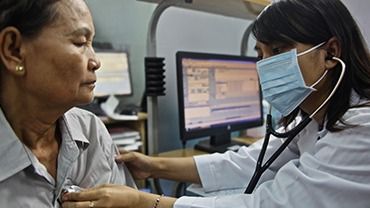

Systems for Health
Swiss TPH is a world leading institution in the application of systems thinking approaches to health systems. We have generated a number of key global guidance documents that are shaping the way policy makers, managers, researchers and development practitioners look at health systems in low- and middle-income countries (LMICs).
We have engaged in health system strengthening activities from conceptual work on systems thinking to health system strengthening programs in LMICs and capacity building at sub-national, national and global level. By uniquely combining research, services, and education and training, Swiss TPH aims to improve the health and well-being of populations through a better understanding of disease and health systems and by acting on this knowledge.
Our core approach to systems thinking as an institute is to both build an academic and theoretical basis for analysing and managing health systems, while developing a series of usable and practically applicable instruments and techniques that target key systems actors.
Contact

Daniel Cobos Muñoz
PhD, MD, MSc
Group Leader
+41612848720
daniel.cobos@swisstph.ch
Key Projects

SYSTAC - The Systems Thinking Accelerator
The Systems Thinking Accelerator (SYSTAC) is being created to connect health systems thinkers across the World. SYSTAC aims to increase the field of applied systems thinking in low- and middle-income country (LMIC) health system strengthening efforts; to provide a platform for exchange experiences and knowledge to take the field forward and capture health system challenges from front liners; and to promote and advocate for the use of systems thinking in health system strengthening efforts. Read more
Systems Thinking for District Health Systems
The Systems Thinking for Strengthening District Health Systems initiative takes a unique approach by supporting countries to apply systems thinking tools and practices to understand and intervene in their local health system. Funded by the Alliance for Health Policy and Systems Research (AHPSR), the initiative works with district and national health systems and research institutions in three countries (Botswana, Pakistan and Timor-Leste) to adapt systems thinking tools and bring systems thinking to district health management.

COVID-19 Health Systems Observatory
The health systems observatory for the COVID-19 response aims to systematically assess the response to COVID-19 in different countries with a systems thinking lens to provide emerging practice that could be useful to face this health challenge; to assess the extent to which transmission disease models have accounted for health systems factors in the needs for pandemic response; and to potentially support a number of LMICs in developing a response founded on systems thinking methods and approaches.
Health System Simulator
Swiss TPH experts are developing a global decision support tool to be integrated into the Novartis Foundation’s Urban Population Health Initiative. This initiative aims to reduce cardiovascular disease (CVD) mortality and morbidity through comprehensive health systems strengthening. By improving data-driven, multi-sectoral decision-making processes that use the data available in cities, health outcomes for CVD are to be enhanced in the long term. Read more
Webinars
What is systems thinking for health systems strengthening?
Health systems are complex adaptive systems with numerous stakeholders and competing priorities. It is often seen that interventions that have been shown to be highly effective in some (controlled) settings, often fail to achieve the expected goals when implemented at scale or integrated into the routine operations of health systems in LMICs.
It is increasingly recognized that understanding and intervening in complex health systems requires a set of approaches, methods and tools derived from systems thinking perspectives. Systems thinking is a ‘way of seeing’, a discipline for problem solving in complex contexts, which posits problems as symptoms of the wider dynamic system. Systems thinking places an emphasis on the interactions among different health system actors, and highlights the importance of the processes and procedures in which actors are embedded. These interactions give rise to features of feedback, non-linearity, time delays, self-organisation and emergence that are observed within complex systems. A systems thinking approach helps health system managers and practitioners move away from linear thinking.
Why systems thinking for district management?
District health managers translate national and regional health policies and strategies into actionable plans to provide health services and meet the overall goals and targets. They are responsible for the operationalization of health policies and for the integration of different disease specific programs[1]. Increasing greater systems awareness in district health managers may better enable them to identify more holistic and sustainable solutions to the challenges they face in coordinating health services.
[1] Cobos Muñoz D, Merino Amador P, Monzon Llamas L, Martinez Hernandez D, Santos Sancho JM. Decentralization of health systems in low and middle income countries: a systematic review. Int J Public Health. 2017;62(2):219-29
Are You a Systems Thinker?
Related Units and Groups
Latest Publications
Adair T et al. Where there is no hospital: improving the notification of community deaths. BMC Med. 2020;18:65. DOI: 10.1186/s12916-020-01524-x
Cobos Muñoz D et al. Better data for better outcomes: the importance of process mapping and management in CRVS systems. BMC Med. 2020;18:67. DOI: 10.1186/s12916-020-01522-z
Karim A, Cobos Muñoz D, Mäusezahl D, de Savigny D. A systems approach to assessing complexity in health interventions: an effectiveness decay model for integrated community case management. Glob Health Action. 2020;13:1794106. DOI: 10.1080/16549716.2020.1794106
Karim A, Cobos Muñoz D, Mäusezahl D, de Savigny D. Thematic areas and complexity of integrated community case management (iCCM) design, implementation, and evaluation: protocol for a scoping review. Syst Rev. 2020;9:205. DOI: 10.1186/s13643-020-01454-y
de Savigny D et al. Integrating community-based verbal autopsy into civil registration and vital statistics (CRVS): system-level considerations. Glob Health Action. 2017;10(1):1272882. DOI: 10.1080/16549716.2017.1272882



